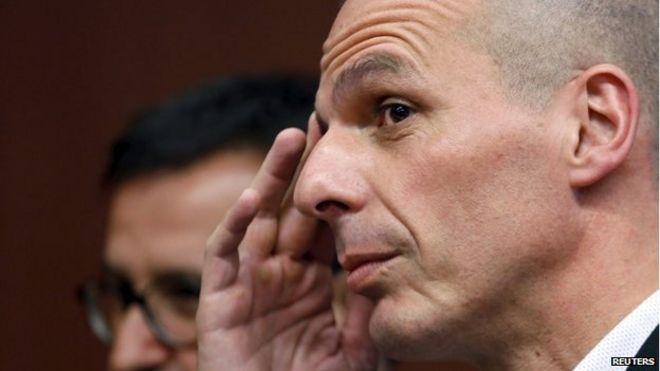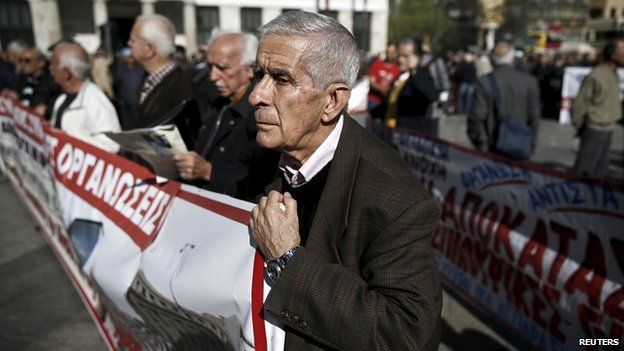Greece taps reserves to pay IMF loan
- 12 May 2015
- Business

Greece was forced to tap into an emergency account to make a debt interest payment to the International Monetary Fund (IMF), it has emerged.
The government raided its reserves to make the €750m (£538m) payment on Monday, one day ahead of the deadline.
It comes after Greek finance minister Yanis Varoufakis warned his country was weeks from running out of cash.
Greece is believed to have borrowed €650m from its IMF holding account to meet the debt interest payment.
Member countries have two accounts with the IMF - one where they deposit their annual quota, in effect their membership fee, and another where they store reserves, including gold, for emergencies.
Country quotas are based on each country's relative size in the world economy.
One Greek official told Reuters on Tuesday that the reserves that the government used must be replenished in the IMF account in "several weeks".
Greece also used €100m of its cash reserves to make the full payment on its IMF bailout loan interest, the official said.
The mayor of Greece's second city, Thessaloniki, revealed last week that he had handed over cash reserves in response to an appeal for money.
Cash crisis
Meanwhile, changes to the law have allowed the central government to collect €600m of local government and other public entity money to help it deal with the cash crisis, a government spokesman said.
On Monday, Mr Varoufakis warned his country's financial situation was "terribly urgent" and the crisis could come to a head in a matter of weeks.
The warning came as eurozone finance ministers met in Brussels to discuss the final €7.2bn tranche of Greece's €240bn EU/IMF bailout.
Ministers said Greece had made "progress", but more work was needed.
"The liquidity issue is a terribly urgent issue. It's common knowledge, let's not beat around the bush," Mr Varoufakis told reporters in Brussels.
"From the perspective [of timing], we are talking about the next couple of weeks."
Greece has until the end of June to reach a reform deal with its international creditors. Its finances are running so low that it has had to ask public bodies for help.

The crisis has raised the prospect that Greece might default on its debts and leave the euro.
The eurozone is insisting on a rigorous regime of reforms, including cuts to pensions, in return for the bailout, but Greece's anti-austerity Syriza-led government is resisting the tough terms.
In a statement, the eurozone finance ministers said they "welcomed the progress that has been achieved so far" in the negotiations, but added: "We acknowledged that more time and effort are needed to bridge the gaps on the remaining open issues."
Eurogroup chairman Jeroen Dijsselbloem said there had to be a full deal on the bailout before Greece received any further payments.
"There are time constraints and liquidity constraints and hopefully we will reach an agreement before time runs out and before money runs out," he said.bbc

No comments:
Post a Comment